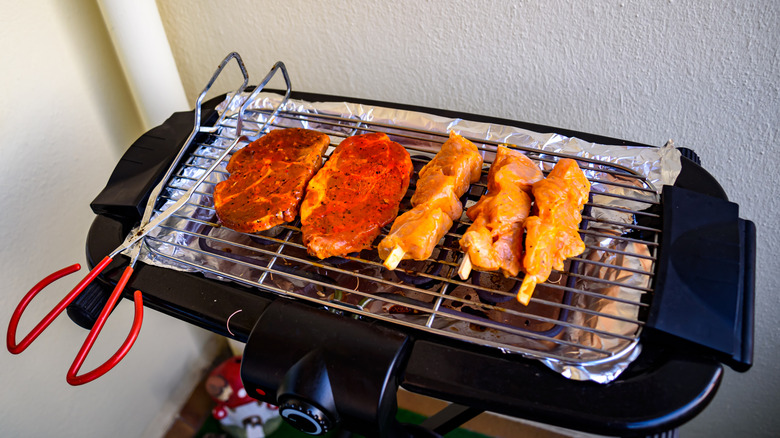Here Are The Pros And Cons Of Using An Eco-Friendly Electric Grill
As the weather gets hotter, you might be tempted to grill up a hearty meal outside, surrounded by friends and family. But grilling outside (especially if you are using a traditional charcoal grill) can present a few challenges — like air pollution, limited portability, and longer heat-up time — and can turn a fun BBQ into a hassle.
That's where electric grills come in handy. In recent years, these grills have become a popular alternative to traditional gas and charcoal grills, as they offer a faster and eco-friendly way to get your food sizzling without all the smoke and carbon emissions. Plus, they're quick to heat, easy to clean, and can be used both indoors and outdoors, making them one of the best electric kitchen gadgets you can buy today.
Despite offering a compelling list of advantages, however, electric grills have some significant downsides you should research before buying. For instance, some electric grills don't have as much space as other traditional charcoal grills. Also, electric models might not satisfy your needs if you believe in the perfection of deep, smoky flavor from charcoal or the high heat of gas grills. With that in mind, let's break down the pros and cons of electric grills to help you decide whether this is the grill for you.
Pros of using an eco-friendly electric grill
An electric grill might not have the same rugged flair as a traditional charcoal grill, but it has a range of perks that make it a strong contender for serious and casual cooks. For starters, electric grills can easily adapt to nearly any cooking environment. Unlike a charcoal grill that requires open spaces and proper ventilation, electric models (like the Bright Grill, which is ideal for summer cookouts) can easily transition from the balcony to the kitchen counter as they don't produce thick smoke or open flames. That's a huge bonus, especially if you live in an apartment where naked flames are restricted.
In addition to their indoor-friendly design, these grills are easy to use. In fact, instead of wrestling with charcoal chimneys and propane tanks, you just need to plug in the grill, turn it on, and you're ready to start cooking. They're also dependent on renewable energy, which eliminates the recurring expenses for charcoal bags and propane tank fills. This also makes them easy to maintain and run, as there is no ash to dump and flare-ups to worry about. You'll also enjoy precise temperature control, which offers endless possibilities (especially when you want a perfect crust on a ribeye or a tender-crisp perfection on a cooked fillet).
Cons of using an eco-friendly electric grill
While electric grills offer several perks, they're not a perfect fit for every backyard chef. One potential downside you should consider before investing in this grill is its power dependency. Sure, an electric grill might be compact enough to fit into a car, but they are not the best portable grills for camping trips or remote outdoor locations (unless you have access to a power outlet or a generator). Also, its compact design means the grilling surface might be too small, especially if you want to cook for a large group.
Now, it's no secret that for many grilling purists, that rich, smoky taste is non-negotiable, and unfortunately, this is where electric grills face their harshest criticism. Although these grills might excel in cleanliness and convenience, even the best electric grill might fail to replicate burning wood or charcoal flavors. This also includes models with smoked boxes and flavor or wood chip trays.


